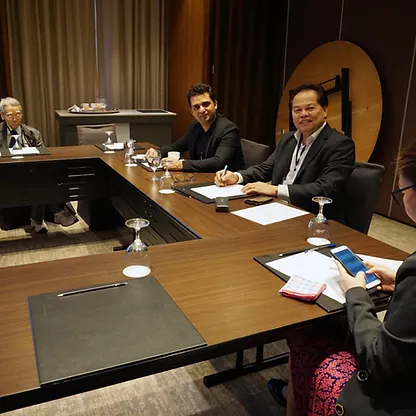About Us
Who We Are
The broad range of socio-cultural, economics, and political settings that characterize the developing countries of Asia and the Pacific have always been a source of both strengths and challenges in the region. Over the years, many constituent states experienced robust economies and significant social progress, but still, many are either in the path of stagnation or vacillating in a course of fleeting economic growth, even protracted decline. Political disorders and social tensions rooted in religious and cultural divides are usually cited as causes, but increasingly, the evidence points towards the issues of relevance and efficacy of policy and effective governance.
On top of these, an increasing threat of environmental degradation confronts many island nations and is likely dampening the potential for catalyzing the regional strengths into a synergy of collective progress and development.

But one thing remarkable happening in the face of all these is the growing clamor, among the general populace, for performance, transparency, and accountability, particularly in public sector management.
This cuts across all political, social, and economic orders among countries of Asia and the Pacific and represents, perhaps, the emerging new order of challenges that the regional leaders now generally face.
This complex development in the Asia Pacific Region puts the APEA in a trajectory that would require demonstration of concrete actions in line with its avowed mission. Since its conception in 2011, and formal establishment in late 2012, APEA seeks to actively perform an advocacy role in promoting effective results-based performance, transparency, and accountability in public sector management through building up capacity in monitoring and evaluation (M&E) among all sectors in Asia and the Pacific.
APEA is now moving forward on a mission to translate the strengths and challenges of the region into results-based deliverables, to foster collective well-being and shared development, all these at the local, community, and national levels in Asia and the Pacific.
Our History
The increasing need to organize in this part of the world where no regional body of evaluation existed has been a strong factor that contributed to the effort of forming the APEA. The development in the evaluation practice in other parts of the world (organization, professionalization, establishing standards, etc.), such as the EES, AfREA, RELAC, and other regional organizations, underscores the necessity of establishing a counterpart in the Asia Pacific Region.
Further, the evaluation associations, societies, or networks operating in the Asia Pacific Region shall bind together for a common cause of advocating and helping build evaluation capacity in all sectors of the society. As welcome developments in the evaluation field are being achieved in other parts of the world, such as progress in the establishment of evaluators’ competency and accreditation system in some evaluation organizations (CES, IDEAS), it is perhaps advantageous to have a consolidation of efforts in the Asia Pacific side. This can help solidify actions in providing support for the move of professionalizing the evaluation practice and giving the region a bigger means of representation in the global arena of evaluation practice.
Hence, after realizing that they were working on achieving similar objectives, the two regional evaluation groups: APEA-NET (Ryo Hirono [Japan], Aru Rassapan [Malaysia], and Kabir Hashim [Sri Lanka]) and ASIA-ASIAN-OCENIAN (Romeo Santos [Philippines], Umi Hanik [Indonesia], Dwiagus Stepantoro [Indonesia], SP Pal [India], Bhabatosh Nath [Bangladesh] and Khairul Islam [Bangladesh], Laura Lou [China], and Subarna Lal Shrestha [Nepal]), thereafter combined their efforts and started to work together as one in establishing the regional association.
The First General Assembly was held in Kuala Lumpur, Malaysia [September 14, 2012], where the formal inaugural launching of APEA was made. Since then its members have been increasing. A number of development agencies, think tanks, financial intermediaries, and non-profit organizations continue to support APEA in its initiative of advancing the cause of evaluation in the Asia Pacific Region.
Learn more about our Board of Directors, Members and Partners below!



